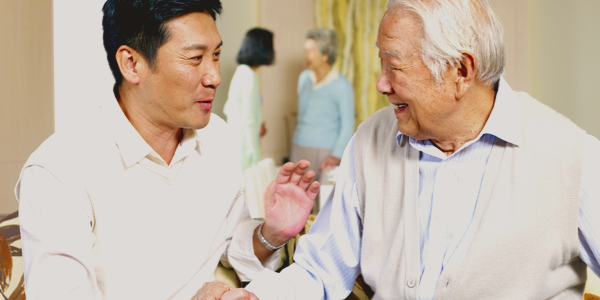Elder Guardianship: What You Need to Know TODAY

Have you been hearing the term “elder guardianship” lately? If you haven’t, you should be. This type of fraud has recently been in the spotlight after the Netflix movie I Care a Lot and an episode of the docuseries Dirty Money.
I Care A Lot tells the story of a professional guardian. The character makes a living using the legal system to strip seniors of their rights through the guardianship process. When she takes over as guardian, she dissolves the senior’s assets and leaves them penniless. Sounds like overly dramatic fiction, right? Well, even though the movie is fictional, the core issue is very real.
Next, an episode of the docuseries Dirty Money profiles real cases of guardianship fraud. Charlie Thrash, an 82-year-old small business owner fell victim to a guardianship scam by his lawyer. His and other cases, like disgraced guardians Rebecca Fierle and Tracey Husdon, have drawn unprecedented attention to the problems with guardianship. These depictions in the media have made more people than ever aware of (and concerned about) elder guardianship and guardianship fraud.
What is elder guardianship?
Elder guardianship is the legal process used when a caregiver realizes a senior can no longer manage their assets or make vital healthcare decisions. In most cases, the caregiver is a family member or other person with power of attorney. But anyone can become a professional guardian. Once the court grants guardianship, the elder becomes a ward of that guardian.
The legal system created guardianship to protect seniors who can’t make decisions for themselves. Ideally designed to prevent these folks from being duped by opportunistic felons, the unfortunate reality is that the guardianship system can be easily manipulated. And if you don’t understand how guardianship works, you or someone you know could be taken advantage of.
The goal of elder guardianship fraud is the same as all fraud: to steal your money and assets. These criminals work with an unscrupulous doctor (that you may have only met with once) to sign off on your diminished mental capacity. If they convince a judge you can no longer make your own decisions, many of your rights will be taken away and given to the guardian.
Protect yourself against elder guardianship abuse by learning what it is and how it works. Here are five facts you should know about elder guardianship.
Fact #1: Every state is different, but the concept is the same
State governments are responsible for their own guardianship systems. Every state has its own rules, regulations and case law. For example, in California, guardianship doesn’t exist. There, elder guardianship is called conservatorship.
Get specific information about elder guardianship where you live by visiting your state’s guardianship association website. If your state doesn’t have a website specifically for guardianship, contact the state bar association to learn more.
Fact #2: Elder guardianship is common and necessary
Roughly 1.5 million Americans live under some form of elder guardianship, most of which are necessary. And guardianships can happen for many different reasons. Anyone from an individual in a coma to a slightly senile grandma can become subject to elder guardianship.
Elder guardianship is invaluable for many families dealing with relatives that can no longer care for themselves. But the cumulative worth of the assets in guardianship is $273 billion, an amount that is undeniably tempting to criminals.
Fact #3: Guardians have the power
If the guardianship is granted, the court takes over. At that time, the judge decides which decisions you can still make and which your guardian will control. Based on the court’s determination, they can have power over
- where you live;
- what medical care you receive and where;
- your end-of-life decisions;
- if you can have a driver’s license;
- your real estate transactions;
- whether or not you can own or possess firearms and weapons;
- if you can enter into a contract;
- when, and if, you can file a lawsuit;
- if you can get married; and
- whether or not you can vote.
Losing these personal freedoms is unthinkable. This type of control is necessary to protect a severely incapacitated senior. But it’s terrifying when an illegal guardianship happens to someone perfectly capable of handling their own affairs.
Fact #4: There’s (almost) no way out
If you ask an attorney to share a case when a senior was able to break free from guardianship, they probably won’t be able to. Unfortunately, there are very few cases of people successfully removing a court-appointed guardianship. Instead, they’ll tell you the goal of guardianship is to rehabilitate the person so they can regain decision-making power. But since the elderly usually enter into guardianship because of an irreversible condition, like dementia, that rarely happens.
When a judge terminates an elder guardianship arrangement, it’s almost always the result of long, drawn-out and contentious court actions.
Fact #5: Elder guardianship is a last resort
Families and caregivers should consider elder guardianship only if they’ve tried every other means to reason with or protect a senior in need. For family members, there are a few avenues to pursue before entering into guardianship:
- case or care management,
- community advocacy groups,
- durable powers of attorney for property or healthcare,
- healthcare surrogacy,
- joint checking accounts,
- living wills, and
- trusts.
Elder guardianship is a serious matter. Entering into this legal process should be a collaborative decision between loved ones, caregivers, medical professionals and the affected individual. But there are those who use elder guardianship to their advantage and successfully defraud seniors. Be aware, and protect your assets!
image credit: shutterstock/imtmphoto

